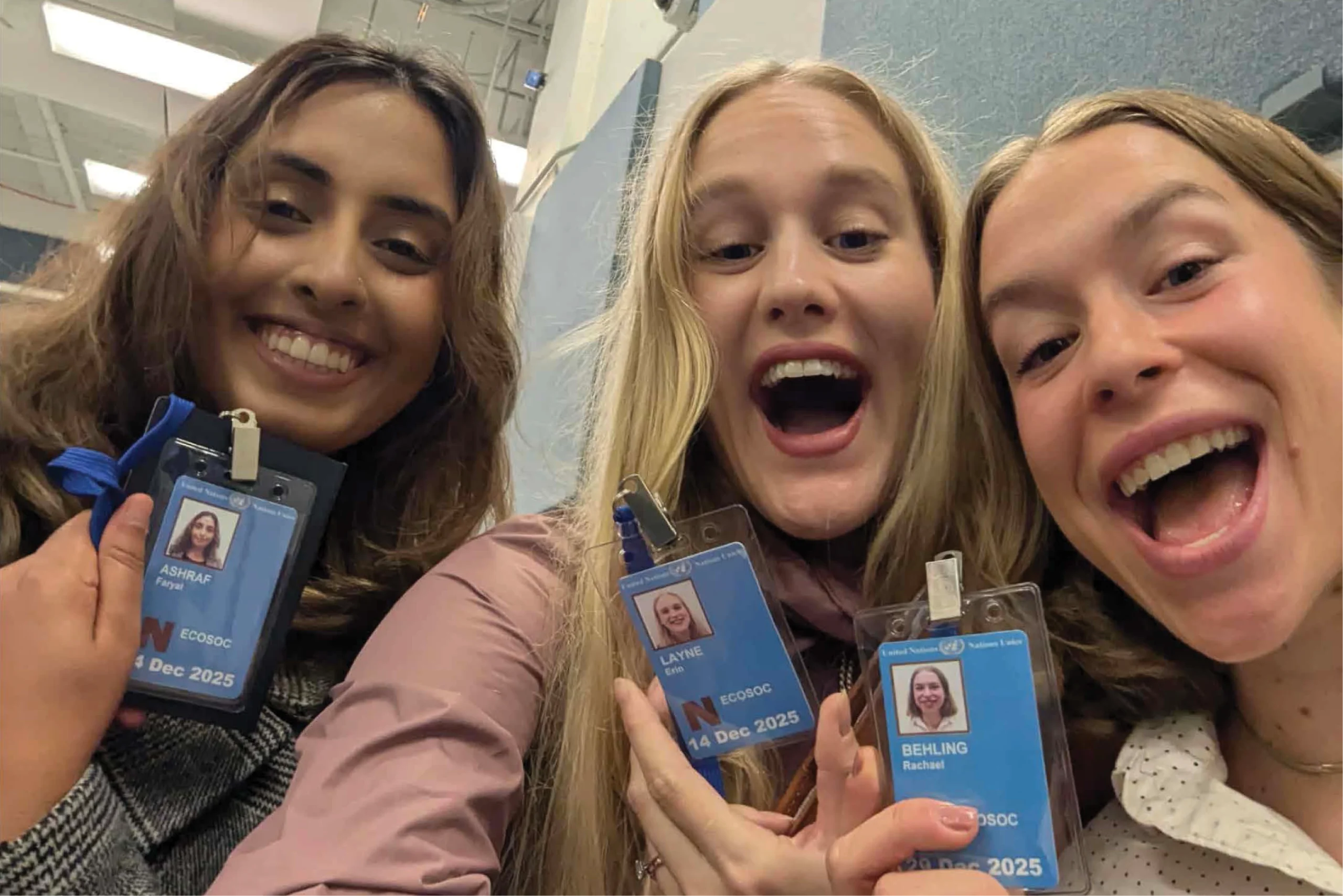WashU Law Students Attend United Nations Sixth Committee Meeting on Crimes Against Humanity
November 10, 2025

In October, WashU law students Erin Layne, Faryal Ashraf, and Rachel Behling, had the chance to attend the United Nations Sixth Committee meeting on Crimes Against Humanity with Professor Leila Sadat. Erin provides a description of her experience below:
On October 13-14, 2025, I had the incredible opportunity to travel to New York to observe the United Nations Sixth Committee as it discussed the draft treaty on the Prevention and Punishment of Crimes Against Humanity. It is a true honor to be a part of the long tradition of Research Assistance who have contributed to the Crimes Against Humanity Initiative. I am deeply grateful to the Whitney R. Harris World Law Institute for sponsoring my visit and making this experience possible.
Seeing the work continue at the UN underscored how academic research can shape international law in practice. The proposed treaty on the Prevention and Punishment of Crimes Against Humanity has a rich academic and diplomatic history—one that began at Washington University School of Law which continues to be involved through the persistence of Professor Leila Nadya Sadat. In the fall of 2024, years of careful drafting, research, and international engagement culminated in a consensus vote in the UN Sixth Committee, a milestone moment for those involved in the project.
This year, the UN 6th Committee session on Crimes Against Humanity was expected to be primarily procedural and lay the groundwork for the Preperatory Committee that will convene in January of 2026. However, very little procedural discussion occurred as states were eager to discuss the substance of the draft treaty.
A total of 127 states and groups participated in the discussion (118 states and 9 regional groups) along with the International Committee of the Red Cross. A total of 94 statements were made. These statements offered much insight into what treaty articles and topics are the primary issues of concern for many states and regions. For example, African states heavily emphasized the importance of including slave trade, colonization, and resource exploitation in the treaty framework. Many states discussed jurisdictional matters such as extraterritorial jurisdiction, universal jurisdiction, and protections for national jurisdiction and domestic law. Other recurring themes included the protection of child and victim’s rights and reparations, and how the new treaty should interact with the Rome Statute and the International Criminal Court. These issues will likely become some of the most debated once the convention is fully underway.
Being present at the United Nations for this discussion was a privilege I will never forget. With ECOSOC credentials, I was able to enter the Committee chamber, listen to live debates, and watch the speaker list evolve in real time as new delegations requested the floor. I even had the chance to meet a delegate. Witnessing this in person helps transform classroom principles and ideas into tangible work done by people every day. Justice and accountability for crimes against humanity is more than a classroom theory, but an attainable goal to which we are imminently inching closer.
I am profoundly thankful to the Harris Institute for making this experience possible. Their support allowed me to see the global legal process in action and participate in the scholarship and advocacy that brings long-awaited treaties like this one closer to adoption. I am honored to be one of the many who have witnessed and engaged in a small part of the work that has taken this treaty from an idea at WashU Law to the floor of the UN. I have no doubt that, through the continued support of the Harris Institute and Professor Sadat, future research assistants will continue this legacy and see this treaty on the Prevention and Punishment of Crimes Against Humanity through to its conclusion—transforming decades of WashU scholarship into lasting international law.
Read more about the Crimes Against Humanity Initiative here.